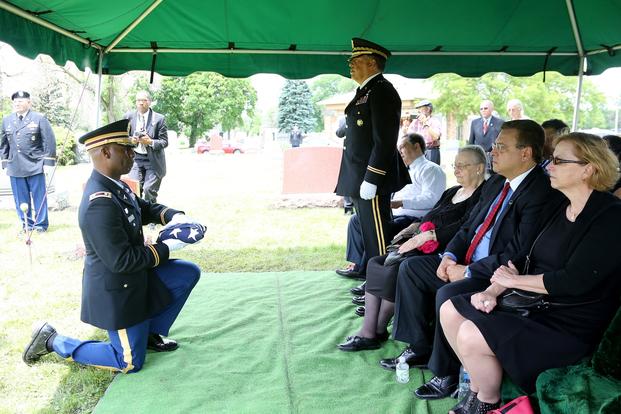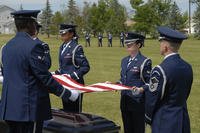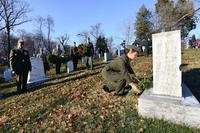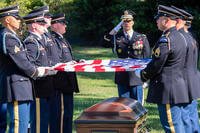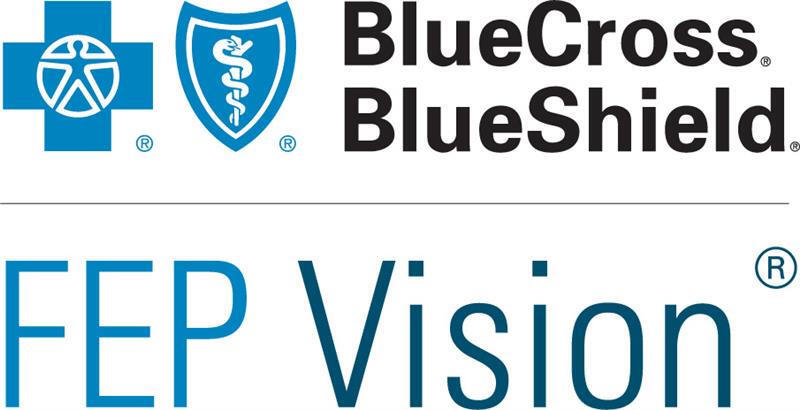Department of Veterans Affairs' burial allowances are cash allowances paid to an eligible veteran's family to help defray burial and funeral costs. VA will pay a different amount depending on whether the death was considered service-connected or if the veteran was hospitalized by VA at the time of death.
Burial or interment in a VA National Cemetery or in Arlington National Cemetery is free. Many states and tribes also have veterans' cemeteries that provide free or inexpensive burials to veterans and their immediate families.
Our state veterans' benefit pages contain more details.
For burial in a private cemetery, VA will reimburse a veteran's family for some of the costs.
VA also furnishes free headstones and markers to most veterans.
Reimbursements are generally described as:
- A burial and funeral expense allowance, including cremation
- A plot interment allowance to place the remains into a final resting place
- A transportation allowance for transporting the veteran's remains to the final resting place
- A headstone or marker allowance
Amounts Payable
Service-related death: The maximum service-connected burial allowance is $2,000. If the veteran is buried in a VA national cemetery, VA reimburses some or all of the cost of transporting the remains.
Non-service-related death: VA will pay a maximum $978 burial allowance and $978 for a plot for veterans who died or die on or after Oct. 1, 2024.
VA hospitalized veteran: If the veteran died while hospitalized by VA, the agency will pay a $978 burial allowance and $978 for a plot.
Indigent veteran with no next-of-kin: VA will furnish either a casket or cremation urn for interment in either a national, state or tribal veterans cemetery.
Headstone or marker allowance: A maximum of $231 for veterans who died or die after Oct. 1, 2023.
Eligibility
The veteran must have been discharged under conditions other than dishonorable, and one of the following must be true. The veteran:
- Died as a result of a service-connected disability
- Had been receiving VA pension or compensation at the time of death
- Had been entitled to receive VA pension or compensation but chose to receive full military retirement or disability pay instead
- Died while hospitalized by VA or while receiving care under VA contract at a non-VA facility
- Died while on authorized travel to or from VA treatment
- Had a claim for VA compensation or pension pending at the time of death and would have been entitled to benefits from a date prior to the date of death based on that claim
- Died on or after Oct. 9, 1996, while a patient at a VA-approved state nursing home
Who Can Receive the Benefit
- Surviving spouse
- The survivor of a legally recognized union
- The veteran's children, regardless of age
- The veteran's parent
- The executor or administrator of the veteran's estate
Application
Eligible surviving spouses of record are paid automatically upon notification of the veteran’s death, without the need to submit a claim. VA may grant additional benefits, including the plot or interment allowance and transportation allowance, if it receives a claim for these benefits.
If necessary, you can apply by filling out VA Form 21P-530, Application for Burial Benefits. You should attach a copy of the veteran’s military discharge document (DD-214 or equivalent) and death certificate. If you are claiming transportation expenses, please attach a receipt for the expenses paid.
You can get help from your funeral director, from your local or state VA office, or by calling VA at 800-827-1000.
Stay on Top of Your Veterans' Benefits
Military benefits are always changing. Keep up with everything from pay to health care by subscribing to Military.com, and get access to up-to-date pay charts and more with all latest benefits delivered straight to your inbox.
